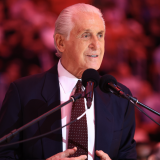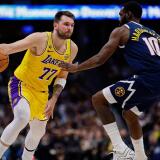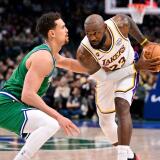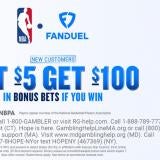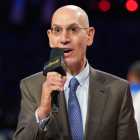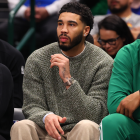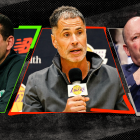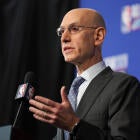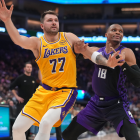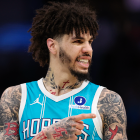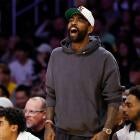Ranking the 10 NBA players most likely to be traded during the 2023-24 season
There should be plenty of trading during the 2023-24 season
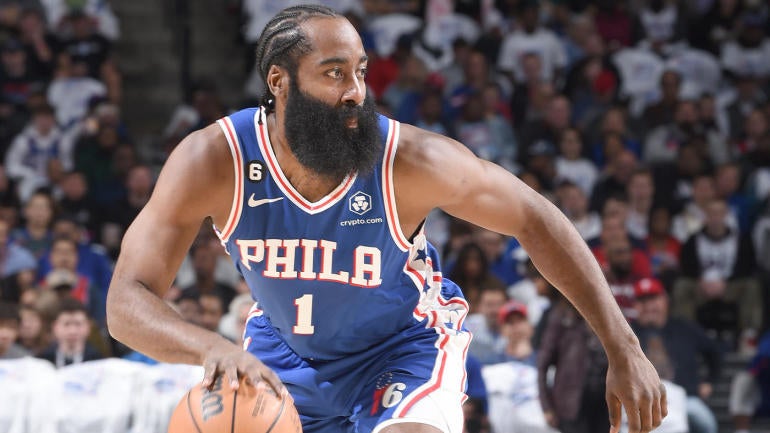
A total of 61 players were traded between opening night and the trade deadline of the 2022-23 season. It was an eclectic group that ranged from former league MVPs (Kevin Durant) to the draft rights to players who have never stepped on an NBA court (Juan Pablo Vaulet). That's what a season's overall trade landscape tends to look like. Every class of player gets represented.
We've just spent the past several months focusing almost exclusively on the superstars of the trade market, and it culminated in the blockbuster deal that sent Damian Lillard to the Milwaukee Bucks. But now that the season is nearly at hand, we're going to need to broaden our horizons a little bit and identify trade candidates as varied as Durant and Vaulet. So let's scour the league landscape for the 10 players likeliest to get traded this season. Some of them will be among the NBA's biggest names. Others? Well... we're not going to reach Vaulet's level, but they're certainly not all going to be Durants.
One quick note before we get going: Kevin Porter Jr. will not be listed here, but that is due to a quirk in his contract. He is currently guaranteed $1 million for the 2024-25 season, but that figure jumps to $3 million on opening night and $6 million five days after the trade deadline. The Rockets are looking for a Porter trade now in part because that $1 million figure is already guaranteed. Odds are, they won't want to take the risk of letting that figure jump to $3 million by keeping him into the season even if it gives them another salary to wield at the deadline. If he isn't traded before the games begin, he will probably be waived, and we are focusing on players we expect to move during the season, not before it. With that in mind, let's begin.
10. DeMar DeRozan
DeMar DeRozan has claimed he wants to retire with the Bulls. Chicago is probably dedicated enough to mediocrity to let him. Here's the problem: Chicago already has around $130 million in committed salary for next season. Unless DeRozan takes a pay cut or gets a prohibitively long contract, new deals for him and Patrick Williams would probably push the Bulls into the luxury tax.
The Bulls have paid the tax just twice since 2003. Virtually everything Chicago has done over the past decade has been geared towards the goal of making the playoffs without paying the tax. When the Bulls have paid the tax, they've done so in seasons in which they felt as though they had a reasonable chance to contend. This Bulls team doesn't. It makes far more sense for the Bulls in basketball terms to cash in the DeRozan chip now, before inking him to a pricey extension, than to keep him and pretend this team has any sort of future. That moving him also aligns with the team's historic financial behavior just makes a trade even likelier.
9. Tyus Jones
Jones, like DeRozan, is on an expiring contract. Washington could easily afford to re-sign him, but the question is why they would bother. What use does a rebuilding team have for the NBA's best backup point guard? Jones will start in Washington, but to what end? Washington's offseason teardown suggests that this team is ready to stop chasing No. 8 seeds. Paying Jones starter money to do so would defy the entire offseason they just had. Why not help their draft position by trading Jones to a contender who can actually use him while picking up some assets in the process? It's hard to believe we now view a tanking move as the likelier outcome for Washington, but if they were willing to trade Bradley Beal just to kickstart a rebuild, why wouldn't they do the same to Jones?
8. P.J. Tucker
Not the 76er you were expecting, eh? Don't worry, we'll get to him. For now, let's broaden out and look at Philadelphia's grander plan. All reports suggest that Daryl Morey is planning to clear the decks so he can maximize cap space for 2024 free agency. That's why they haven't re-signed Tyrese Maxey yet. Doing so would almost certainly more than double his $13 million cap charge for next summer. For Philadelphia to execute this strategy properly, though, it needs to clear everyone except Maxey and Joel Embiid. That leaves two loose ends before we consider any major in-season moves.
Paul Reed will take care of himself. His contract becomes unguaranteed if the 76ers fail to win a playoff series. If they do win a series, moving Reed's $7.2 million salary is easy enough. But P.J. Tucker's $11.5 million figure might be a bit tougher to dump into someone's cap space since he's currently the second-oldest player in the NBA. Contenders will probably be interested in him, but contenders don't have cap space. It would therefore behoove Philadelphia to move him now, to a winner with an expiring contract it can send back. Morey is a master manipulator of the salary cap. If he senses this team has no championship equity this season, he's not going to bother keeping Tucker on a roster with a sub-Finals ceiling.
7. Pascal Siakam
Here's a sobering statistic: the Toronto Raptors gave eight players at least 100 total minutes in the 2019 playoffs and five of them left for nothing in free agency. A sixth, Kyle Lowry, could have been traded for a haul at the 2021 deadline but was instead signed and traded for a pittance that summer when it became clear that he would have walked for free. They managed to swap No. 7, Norm Powell, for a player in Gary Trent Jr. that they may well lose for nothing next offseason. The Raptors didn't even break up their championship team. They sat back and watched the vultures pick it clean.
As you've probably surmised, Pascal Siakam is No. 8. Masai Ujiri himself has said that the Raptors haven't started extension negotiations with Siakam. The rest of that availability was hardly an encouraging sign for Siakam's future in Toronto. Ujiri said that the Raptors were selfish as a team last season. Siakam shot back that he doesn't "have an ounce of selfishness in me." Siakam will have a robust trade market if the Raptors make him available. The only real question here is if Ujiri will lower his outlandish demands enough to actually consummate a deal or simply risk another departure for nothing in the summer of 2024.
6. Buddy Hield
The Pacers have already explored Hield trades. It's not hard to see why. He's the sort of movement shooter stagnant contenders crave, and he's on an expiring contract. The Pacers could afford to re-sign him, but have no great need to. Tyrese Haliburton and Bennedict Mathurin are the future of this back-court, and Andrew Nembhard has long-term starter potential as well. Couple that trio with incumbent backup point T.J. McConnell and the incoming Bruce Brown and suddenly the Pacers simply have more guards than minutes. Someone will give Indiana a valuable pick for Hield. It's just a matter of when.
5. Clint Capela
Atlanta's luxury tax situation is even more dire than Chicago's. The Hawks have roughly $149 million committed for next season, and that's before factoring in new deals for Onyeka Okongwu and Saddiq Bey. Both will push for starter money. and there's a good chance the Hawks view them as long-term starters next to Trae Young, Dejounte Murray and De'Andre Hunter. That makes Capela the odd man out, and the Hawks have seemingly recognized that. They discussed a Capela trade with the Dallas Mavericks in June and those talks will probably pick back up during the season unless either the Hawks or Mavericks are significantly better than expected. Capela is still a good starting center, but he's probably a bit too pricey to be Atlanta's for much longer.
4. Alec Burks
Here's a very basic "good older player on a bad younger team" trade candidate. Detroit has three young guards taken in the top five of the past three drafts in Cade Cunningham, Jaden Ivey and Ausar Thompson. They'll need shooting alongside those players, especially since Troy Weaver seems to have his heart set on playing two big lineups, but Joe Harris is probably too expensive and injury-prone to get much in a trade, and Bojan Bogdanovic will likely cost more in a deal than Burks, limiting his market among the contenders. When the deadline rolls around, it just won't make sense for Detroit to keep Burks on the roster when there aren't going to be many minutes for him.
3. James Harden
Alright, now we're ready for the main event. For most of the offseason, a Harden trade seemed unlikely. The Clippers weren't meeting Morey's price. Nobody else seemed interested. But now that we know the Clippers have at least offered an unprotected first-round pick and a swap, a deal seems as though it's in reach. After all, Philadelphia seemingly doesn't plan to keep Harden beyond the season. It makes little sense to keep him in that context. Even if it's not the Clippers, circumstances can change within the season. All it takes to drive up the price is one more team to unexpectedly need a veteran guard and Philadelphia will be able to make a deal. At this rate, it seems more like a matter of when than if.
2. Malcolm Brogdon
You could probably talk yourself into Portland keeping Robert Williams III. Even though he's overqualified to serve as a backup center, a lower-minute role in Portland could help keep him healthy for a while and serve as insurance if Deandre Ayton isn't a long-term fit. In certain lineups, it's not inconceivable that they even play together. But Malcolm Brogdon? Nope. Scoot Henderson, Shaedon Sharpe and Anfernee Simons are all guards. Brogdon has too much value to winning teams to languish away on a rebuilder, and he's too expensive to keep as essentially a fourth guard. He'll be a solid veteran for the young Blazers until a winner plucks him away in February.
1. Kira Lewis Jr.
I told you not everyone on this list would be famous. According to Spotrac, there are currently 11 teams over the luxury tax line. Eight of them are at least $11 million over the line, so ducking under the tax in-season would be a tall order. The Bulls are just barely over the line for now, but have two contracts (Terry Taylor and Carlik Jones) that don't fully guarantee until January, so Chicago will likely use one of them to avoid the tax. The Lakers are around $1.3 million over the line, but they'll make their determination in February. If they disappoint, they can use Taurean Prince in a trade to easily get under the line, but in the likelier event that they're winning, they'll probably look to add salary and go for the title rather than cheap out and subtract money.
That leaves New Orleans. The Pelicans are $2.9 million over the tax line, a non-trivial figure. They have eight players making at least $5 million this season. Six of them are core rotation players. The seventh, Dyson Daniels, is a second-year lottery pick. The eighth is Lewis, who tore his ACL in 2021 and hasn't shown much since. Even if he's back at full strength, finding minutes on a Pelicans team this deep is going to be a struggle. Let's assume New Orleans keeps a starting five of C.J. McCollum, Brandon Ingram, Herb Jones, Zion Williamson and Jonas Valanciunas. Trey Murphy, Jose Alvarado and Larry Nance Jr. are also ahead of him on the bench pecking order, and Daniels, Naji Marshall and Cody Zeller probably are as well. Maybe injuries get Lewis some minutes early in the season, but when the time comes for the Pelicans to avoid the tax, his salary is simply the easiest for them to move without disturbing their expected rotation.


